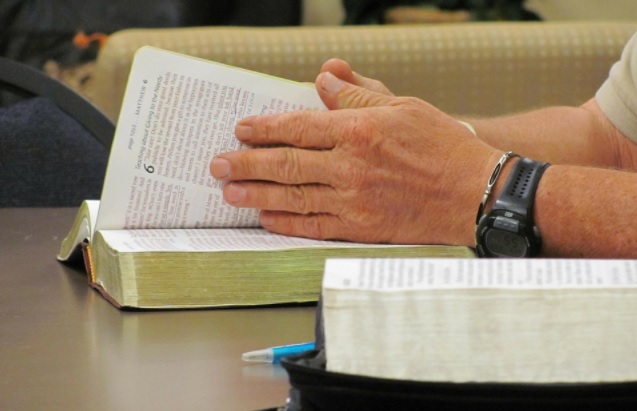“Go therefore and make disciples of all the nations…teaching them to observe all that I commanded you; and lo, I am with you always, even to the end of the age” (Matthew 28:19-20, NASB).
——————–
Contents:
1) Humility Test (Bryan Gibson)
——————–

-1-
Humility Test
Bryan Gibson
“Humble yourselves in the sight of the Lord” (James 4:10). “Humble yourselves under the mighty hand of God” (1 Peter 5:6). Humility is not optional, not if we want to please God and go to heaven. But exactly what is humility, and how does it manifest itself in our lives? How can we tell if we’re truly humble?
Understand, it’s not just making a few self-effacing remarks from time to time (“You know I’m not the smartest person in the world”; “I’m still working on myself, because I know I’ve got a long way to go”). Nothing wrong with these remarks, if said sincerely, but true humility is much more. It’s exhibited in real life situations—in one’s attitudes and actions—especially in situations that really test one’s humility.
So let’s do this—let’s take a humility test and see how we do. These questions may sound familiar if you’ve read Sewell Hall’s excellent book, “Hallmarks,” (page 267). I’ve taken some of his questions, expanded on them some, and added several more. We’ll need to do this over several articles, which is okay, because this subject deserves that much attention. Let’s make sure we give honest answers; it’s the only way to know if we have truly humbled ourselves in the sight of the Lord.
1. Do I ever question the righteousness of God’s actions (or inactions)? Job did, but he learned better: “I have uttered what I did not understand, things too wonderful for me, which I did not know…therefore I abhor myself, and repent in dust and ashes” (Job 42:3, 6). The Psalmist said, “My tongue shall speak of Your righteousness all day long” (Psalms 71:24)—it’s awful hard to do that and question Him at the same time.
2. Do I question the reasonableness of any commandment given by God? Maybe I don’t actually say it’s unreasonable, but if I neglect to keep it on the same basis, or reshape it to make it more “reasonable,” haven’t I “said” the same thing? For me to question the reasonableness of God’s commandments is to question both His righteousness (“the entirety of Your word is truth, and every one of Your righteous judgments endure forever”—Psalms 119:160) and His love (“the LORD commanded us to observe all these statutes…for our good always”—Deuteronomy 6:24).
3. Do I ever think in terms of what God owes me, or what I deserve from Him? “Who has preceded Me (“given to Me”—NAS) that I should pay him? Everything under heaven is mine” (Job 41:11). How humbling is that—to know that God doesn’t owe me anything, that to whatever degree I feel entitled or deserving, I couldn’t be more wrong. It’s humbling, but it’s also liberating, because I’m no longer burdened with thoughts of what God should do. Free from those thoughts, I can now express humble gratitude for every single day God gives me, and for every single blessing He bestows on me, including my soul’s salvation.
4. Do I take for granted what others do for me, or give me, or do I always express thanks? The extent to which they help me, the size of the gift, etc.—none of that matters. Am I thankful for each and every gesture of kindness, no matter how large or small? Paul sure was, for the many ways in which many people served him and the gospel—people like Phoebe (Romans 16:1-2), Onesiphorus (2 Timothy 1:16-18), Epaphroditus (Philippians 2:25-30), Aquila and Priscilla (Romans 16:3-4), Timothy and Titus (2 Corinthians 7:6-7; Philippians 2:19-20), just to name a few. Make no mistake about it; humility and a deep sense of appreciation go hand in hand.
5. In my marriage, which concerns me most—what my spouse does for me, or what I do for my spouse? Do I esteem my spouse better than myself—have I become her servant? (Philippians 2:3). Have I become too busy looking out for my own interests that I’ve neglected my spouse’s? (Philippians 2:4). I know what Christ gave up to look out for my interests (Philippians 2:5-8)—what do I give up for my spouse? And what about my brethren in Christ—am I waiting for them to do for me, or I am too busy doing for them?
6. Do I ever look with contempt or disdain on others due to their race, their less than stellar background, their lack of intelligence, poverty, ignorance, etc.? Are there people I consider “beneath me”? Job was held in high esteem, at least before he suffered so greatly, but look at the manner in which he spoke of his servants: “Did not He who made me in the womb make them? Did not the same One fashion us in the womb?” (Job 31:15). “Showing all humility to all men”—that’s what the Lord teaches us to do, for this important reason: “for we ourselves were once foolish, disobedient, deceived, serving various lusts and pleasures, living in malice and envy, hateful and hating one another” (Titus 3:2-3).
7. Do I ever try to impress others with my superiority over them? Do I boast of my good works, my wealth, my education, or any other accomplishment? Or, do I perhaps try to do the same through my children? Could there possibly be some smugness in my speech and behavior toward others? Bottom line, is my speech and behavior consistent with the One who described Himself as “meek and lowly” (Matthew 11:29)?
8. Do I consider any act of service beneath my dignity? Do I consider myself too important to do “less important” things? Would I wash feet, or anything comparable to that? “If I then, your Lord and Teacher, have washed your feet, you also ought to wash one another’s feet” (John 13:14). A cup of cold water—doesn’t sound like much, but hear Jesus: “And whoever gives one of these little ones even a cup of cold water because he is a disciple, truly, I say to you, he will by no means lose his reward” (Matthew 10:42). To keep a local church functioning properly, a number of “mundane” things have to be done. Can the Lord, and my brethren, count on me?
9. Am I as eager to serve when I’m NOT seen as when I AM seen? “But when you do a charitable deed, do not let your left hand know what your right hand is doing, that your charitable deed may be in secret; and your Father who sees in secret will Himself reward you openly” (Matthew 6:3-4). Which do I desire more, the honor of men, or the honor of God? (John 5:44). Quiet, humble service—the kind that receives little or no recognition from other people—am I okay with that? And another closely related question—am I as eager to serve those who can’t pay me back as those who can? “When you give a dinner…do not ask your friends, your brothers, your relatives, nor rich neighbors, lest they also invite you back, and you be repaid. But when you give a feast, invite the poor, the maimed, the lame, the blind. And you will be blessed, because they cannot repay you; for you shall be repaid at the resurrection of the just” (Luke 14:12-14).
10. Do I rejoice in the honors and accomplishments of others, or do I envy? “Rejoice with those who rejoice, and weep with those who weep” (Romans 12:15). The second part typically comes much easier to us, but the first part, the rejoicing part—well, that can sometimes be a different story. When others have reason to rejoice, do I feel the need to “one up” them? Or, do I ever feel the need to “block” their moment in the sun, to do or say something that might diminish their good news? If any of this sounds even vaguely familiar to me, then I’ve got serious work to do.
11. Am I sensitive and easily offended, especially when it comes to advice or correction in spiritual matters? Am I that person everyone talks about, the one around whom everyone must “walk on egg shells”? If that’s me, eventually most people will give up on me—they’ll no longer give me the advice or the correction I so desperately need. Here’s the humble approach: “Let the righteous strike me; it shall be a kindness. And let him rebuke me; it shall be as excellent oil; let my head not refuse it” (Psalms 141:5). What we call thin-skinned is really self-centered.
12. Do I enjoy holding a grudge, or do I have the same spirit as my Savior? “Father, forgive them, for they do not know what they do” (Luke 23:34). What if they DO know what they do—is it okay then? It’s awful hard to be “ready to forgive” (Psalms 86:5) and hold a grudge at the same time. If I continue to be upset over something said or done to me, it must mean I haven’t died—“I have been crucified with Christ; it is no longer I who live, but Christ lives in me…” (Galatians 2:20). Indeed, Christ did live in Paul, because his spirit toward those who wronged him was the very same as his Savior’s: “At my first defense no one stood with me, but all forsook me. May it not be charged against them” (2 Timothy 4:16).
13. Do I have any trouble saying, “I’m sorry”? It may be that I forgive easily, because at least in that situation, I’ve got the “upper hand.” But, when I’m the one in the wrong, the right words, the right attitude, may not come as easily. “Therefore, if you bring your gift to the altar, and there remember that your brother has something against you, leave your gift there before the altar, and go your way. First be reconciled to your brother, and then come and offer your gift” (Matthew 5:23-24). “I’m sorry” is not a sign of weakness—it’s a sign of strength, the kind of strength which comes from true humility.
14. Do I listen to those older and wiser than me—those who are more experienced and mature in the faith? “Wisdom is with aged men, and with length of days, understanding” (Job 12:12). Yes, there are exceptions to this “rule,” but generally speaking, the older folks have a lot to offer—if we’ll just listen. King Rehoboam sure wishes he had (1 Kings 12:6-11).
“You will save the humble people; but Your eyes are on the haughty, that You may bring them down” (2 Samuel 22:28).
— via Plain Words from God’s Word, August 31, 2023
(This article was originally in three parts at Bryan’s Facebook site, but have all been combined for this bulletin.)
——————–
The Steps That Lead to Eternal Salvation
1) Hear the gospel — for that is how faith comes (Rom. 10:17; John 20:30-31).
2) Believe in the deity of Jesus Christ, the Son of God (John 8:24; John 3:18).
3) Repent of sins. For every accountable person has sinned (Romans 3:23; Romans 3:10), which causes one to be spiritually dead (Ephesians 2:1) and separated from God (Isaiah 59:1-2; Romans 6:23). Therefore, repentance of sin is necessary (Luke 13:5; Acts 17:30). For whether the sin seems great or small, there will still be the same penalty for either (Matt. 12:36-37; 2 Cor. 5:10) — and even for a lie (Rev. 21:8).
4) Confess faith in Christ (Rom. 10:9-10; Acts 8:36-38).
5) Be baptized in water for the remission of sins (Mark 16:16; Acts 2:38; 22:16; 1 Pet. 3:21). This is the final step that puts one into Christ (Gal. 3:26-27). For from that baptism, one is then raised as a new creature (2 Cor. 5:17), having all sins forgiven and beginning a new life as a Christian (Rom. 6:3-4). For the one being baptized does so “through faith in the working of God” (Col. 2:12). In other words, believing that God will keep His word and forgive after one submits to these necessary steps. And now as a Christian, we then need to…
6) Continue in the faith by living for the Lord; for, if not, salvation can be lost (Matt. 24:13; Heb. 10:36-39; Rev. 2:10; 2 Pet. 2:20-22).
——————–
Tebeau Street
CHURCH OF CHRIST
1402 Tebeau Street, Waycross, GA 31501
Sunday: 9 a.m. Bible Classes and 10 a.m. Worship Service. Congregational Song Service: 5 p.m. for every first Sunday of the month.
Wednesday: 7 p.m. Bible Classes
evangelist/editor: Tom Edwards (912) 281-9917
Tom@ThomasTEdwards.com
https://thomastedwards.com/go/all.htm (This is a link to the older version of the Gospel Observer website, but with bulletins going back to March 4, 1990.)












